
 Physics World Weekly Podcast
Physics World Weekly Podcast International Year of Quantum Science and Technology: our celebrations begin with a look at quantum networks and sensors
Jan 2, 2025
In this engaging discussion, Turkish quantum physicist Mete Atatüre, head of the Cavendish Laboratory at the University of Cambridge, delves into the exciting commemorations for the International Year of Quantum Science and Technology. He shares insights on the pivotal role of Quantour, the quantum light source, and the innovations in quantum sensors and networks. Atatüre also unpacks the complexities of quantum communication and the journey from theory to practical applications, all while celebrating Heisenberg's groundbreaking contributions to quantum mechanics.
Chapters
Transcript
Episode notes


